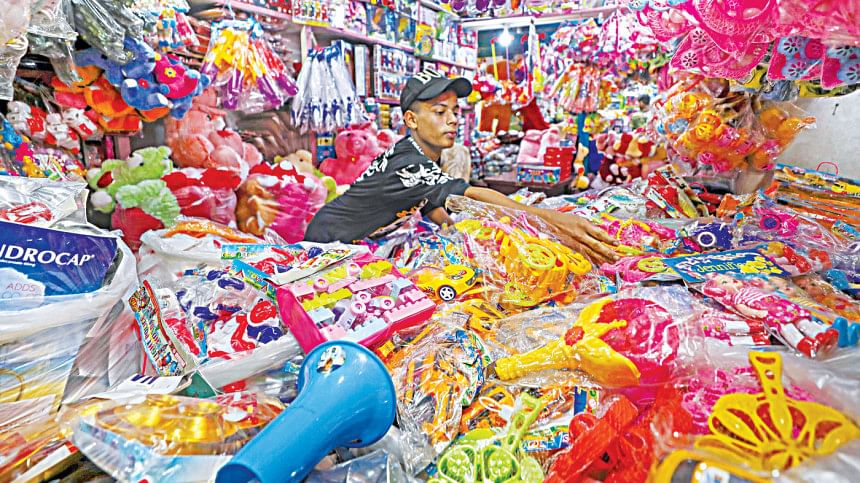Plastic toy sales almost halve

Plastic toy makers and retailers in Bangladesh are feeling the pinch of a nearly 40 per cent drop in sales amid higher raw material prices fuelled by raging inflation stemming from the Russia-Ukraine war.
As a result, a number of toy factory owners have been forced to lay off employees in a bid to survive.
Bangladesh has been facing a major macroeconomic crisis since February following Russia's invasion of Ukraine, with the ensuing global inflation sending domestic consumer prices to a decade high in August.
Toys are sold more or less year-round at Dhaka's Chawkbazar, the largest wholesale toy market in Bangladesh, but sales have been quite low this year.
Abdul Kader Jilani, proprietor of Kader Toys Plastic Works, said sales are usually very good at this time thanks to the various fairs and other events that take place in winter.
"This year though, sales have been far less compared to what it was before the Covid-19 pandemic in 2019," he added.
Jilani then said the country's current economic is not very good and so, people are placing more importance on buying daily necessities rather than luxuries such as toys.
"Compared to normal times, sales are now at least 30 per cent less. We have kept the factory running by reducing production and the worker's salaries," he added.
According to a monthly report by the World Food Program published in November last year, the cost of running a household for most people in Bangladesh has increased while their incomes have decreased.
In addition, raw material imports for toys have decreased significantly due to the US dollar crisis.
"So, production has also decreased, and this has had quite a negative impact on their [toy sellers] businesses," Jilani said.
Rahim Ullah, proprietor of Mohammadia Plastic Products in Dhaka's Lalbagh area, said they have been unable to import raw materials amid the ongoing US dollar crisis.
"And even if production is decreased, we still have to pay rent and the staff's salary every month," he added.
Ullah went on to say that even at the beginning of the year, products worth Tk 1 lakh to Tk 1.5 lakh were sold every day. Now, products worth just Tk 10,000 to Tk 16,000 are sold daily.
Citing the current economic situation, Ullah said he was forced to lay of 21 of his 30 employees just last week.
"We were forced to lay them off because of the current crisis. I did not see any other way as it has become very difficult to sustain the business," he added.
In another bid to survive, many toy makers and sellers have reduced their profit margins.
For example, Abdul Hye, proprietor of Tajul Plastic Products in Keraniganj upazila of Dhaka, reduced his profit margin to 3 per cent from 10 per cent despite the higher raw material costs.
"The business is somehow surviving," said Hye, who laid off 10 per cent of his workforce two months ago.
Toys play a major role in developing a child's intelligence quotients, increasing motor development, and improving decision-making ability.
But with the rising cost of living, many guardians no longer buy toys for their kids like they used to. One such person is Rozina Begum.
The resident of Dhaka's Mirpur said her baby is almost one year old now.
"Earlier I used to buy toys worth Tk 800 to Tk 1,000 for him every month. But for the last few months I have been buying toys worth between Tk 300 to Tk 400," she added.
About a decade ago, some 90 per cent of the toys in Bangladesh were imported, according to industry people. Now though, just 10 per cent of the toys are imported.
With about 100 toy makers operating in the country and 12 of them being large companies, the market is estimated to be worth around Tk 7,000 crore. Of this amount, local producers contribute around Tk 4,000 crore while the rest is imported.

 For all latest news, follow The Daily Star's Google News channel.
For all latest news, follow The Daily Star's Google News channel. 



Comments